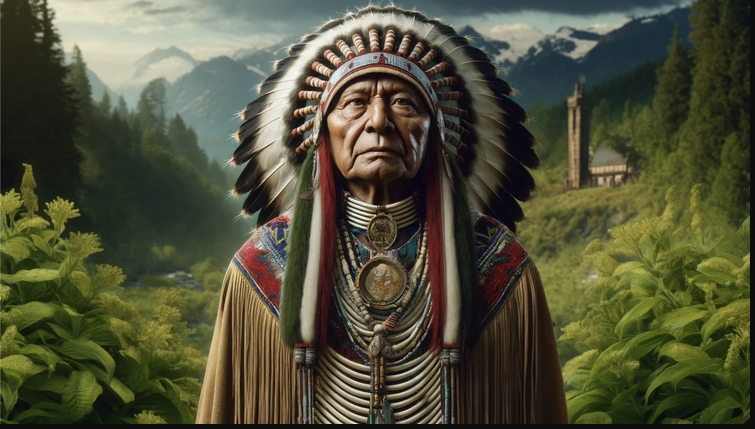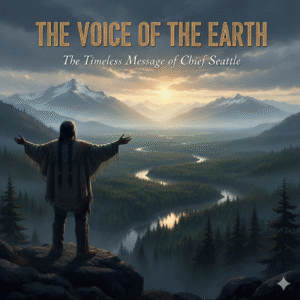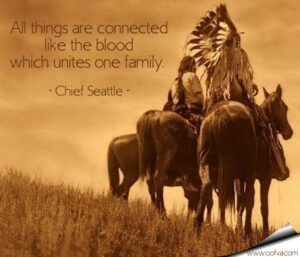
Kavindya Senevirathna


The Red Indian leader Seattle was a man who left a timeless lesson to the world about the profound bond between man and nature. He lived in the Washington region of North America during the mid-19th century and was known not for violence or destruction, but for his humanity, wisdom, and steadfast intelligence. The great city of Seattle bears his name today. Yet, although many know the name, few truly understand his voice, his spirit, and the message he gifted to the world. He lived with an Indian mind a soul deeply rooted in the land and in nature leaving eternal wisdom for generations to come.
Seattle’s leadership emerged at a time when white settlers arrived in the lands of the Red Indians and began to seize their territories. Although the Indian way of life was not technically advanced, it was spiritually and culturally far superior. They possessed a deep understanding that man was a part of nature not its master. They believed that trees, water, wind, animals, and even the memories of the past were all parts of one living system. This belief was the foundation of their existence. But with the arrival of the white man, their world trembled. The newcomers advanced in agriculture, commerce, and engineering, while the land, culture, and spirit of the Indians began to fade away.
Seattle’s role as a leader during this time was a burden both noble and grave. He sought to preserve the freedom and dignity of his people. Yet, he stood against a mighty power. Among his most influential neighbors were the white presidential supporters who sought to buy or forcibly take the land of the Indians. In response, Seattle raised his voice for his people, delivering a statement that became one of the most remarkable speeches in world history the address now known as “Chief Seattle’s Speech.” It was not merely a protest, but a profound reflection on human arrogance, the destruction of nature, and the loss of the soul.
His message to the world was simple yet eternal: “You don’t own the land; the land owns you.” These words became the foundation of modern environmental thought. Seattle believed that water, trees, the sky, and clean air were not possessions to be sold, but divine gifts. To harm them was to wound the human spirit itself. Every line of his speech carries deep wisdom. “The idea of selling our land is a distortion,” he said. “Can you sell the water of a river, the sky, or the lightning in the clouds? These do not belong to man they belong to all beings.”
Throughout his life, Seattle embodied humility, dignity, and compassion. He believed that true leadership lies not in weapons or conquest, but in peace and wisdom. His guidance gave his people not only spiritual strength but the courage to endure. As American political influence and cultural dominance reshaped the world of the Indians, Seattle’s voice became a cry of resistance and remembrance. “Our clay is not death,” he said. “It is living life. The breath of our mothers and the signatures of our ancestors are in this clay.” Through these words, he reminded humanity that the land is not a commodity it is the living memory of the earth, a home for our souls.
A central theme in his speech was the spirit of the ancestors. He believed that the souls of the dead live on in every part of the earth. Thus, to sell the land was to sell their spirits. This belief instilled in his people a profound respect for the earth. Today, his message continues to echo through environmental movements across the world. His words are as meaningful in the 21st century an age of artificial living and ecological collapse as they were in the 19th century.
Seattle’s teachings rest on the sacred connection of the human soul with nature. He believed that all beings share one life. “If you pour poison into the water, it will return to your own body. If you insult the clay, you destroy your own clay. Whatever a man does to the land, he does to himself.” These words now stand as a prophetic warning to a world burdened by pollution, deforestation, and environmental decay. His vision reveals that life does not exist only for humans it is a shared inheritance of all living things.
One of the most profound aims of his message was to restore the trust and harmony that modern humanity has lost. The spoke of a spiritual bond inherited from the ancient Indian culture a connection between man, spirit, and earth. When his words are remembered, the world is drawn closer to the rhythm of nature and to its forgotten roots. Seattle’s message reminds us that while advanced technology and endless innovation may promise progress, they often lead to a hollow, spiritless existence. “When we live,” he said, “the human spirit is built by merging with the clay. When that bond is gone, man no longer lives.”
Today, his name has become that of a city, yet his words still whisper through the forests and rivers. In this era of global destruction, his message gains new life and urgency. The “time” he spoke of is the time we live in now. His speech is not just a call to humanity but a plea from the earth itself. To him, man was never a master of nature, but merely one of its children. Only a person who understands this truth can truly be free.
Seattle’s life and philosophy became a guiding light for global environmental movements and a deeper understanding of the human spirit. He showed that a leader’s greatness lies not in power, but in voice — not in authority, but in conscience. His timeless message resounds: “Do not think the land is yours simply because you hold it in your hands. You are its guardian, responsible for its sacred worth.” His leadership revealed that spiritual intelligence is a force far greater than any weapon a strength that can lead humanity through its greatest challenges.
After his death, when his body returned to the womb of the earth, his people believed that his spirit still cried through the trees, the rivers, and the sky. Though his name endures as a city, his vision lives on shaping a culture of reverence for the environment and the sacredness of life. Each time we revisit his words, we are reminded of the eternal values of humanity respect, peace, and love for the earth.
Ultimately, Seattle’s message transcends time. His voice continues to echo in the hearts of those who listen. He understood that even as humankind builds a world ruled by machines and technology, the earth follows its own laws. His message remains a divine reminder: “If you destroy nature, you destroy yourself. If you protect life, you protect your soul.” These words are not merely the voice of Chief Seattle they are the voice of the earth itself.